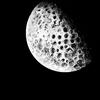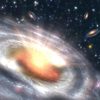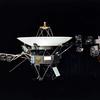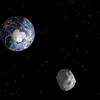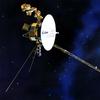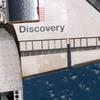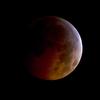Neil deGrasse Tyson
Astrophysicist, Director of the Hayden Planetarium at the American Museum of Natural History
Neil deGrasse Tyson appears in the following:
The Times They Are a-Changin'
Monday, December 30, 2013
Neil deGrasse Tyson On How Much We Don't Know About Our Universe
Monday, November 04, 2013
Neil deGrasse Tyson on Why Voyager 1 Matters
Monday, September 16, 2013
Ann Druyan, creative director of the NASA Voyager Interstellar Record Project, Carl Sagan's widow, and now executive producer of "Cosmos: A SpaceTime Odyssey", talks about the golden records on board Voyager 1 and reflects on the news that it is now in interstellar space. The record project was intended to demonstrate the diversity of life and culture on Earth for future humans or any intelligent extraterrestrial life it may come into contact with. Plus, Neil deGrasse Tyson, astrophysicist with the American Museum of Natural History and author of the book The Pluto Files: The Rise and Fall of America's Favorite Planet, joins the conversation to talk about the scientific development that Voyager represents. He's the host of the new "Cosmos" series.
Earth's Near Misses With Asteroids
Friday, February 15, 2013
Neil deGrasse Tyson on Russian Meteor
Friday, February 15, 2013
What a Slinky Knows
Monday, September 10, 2012
Neil deGrasse Tyson on NASA and Space
Monday, March 05, 2012
Neil deGrasse Tyson discusses NASA and the future of space travel, now that NASA has put human space flight on hold. In Space Chronicles: Facing the Ultimate Frontier , he shares his thoughts on topics from the missteps that shaped the recent history of space travel to how aliens, if they existed, might go about finding us.
Guest Picks: Neil deGrasse Tyson
Monday, March 05, 2012
Astrophysicist Neil deGrasse Tyson was on the Lopate Show to discuss the future of American space travel, now that NASA's space shuttle program has ended. He also told us that he's a fan of Broadway musicals. Find out what else Neil's been reading and listening to.
Have We Given Up on the Final Frontier?
Tuesday, February 28, 2012
After half a century at the forefront of space exploration, NASA’s been hit by hard times. Last year, its groundbreaking and celebrated space-shuttle program was shuttered. The cosmos won’t see another American spacecraft for at least another decade, and that once dreamed of trip to Mars — not too long ago a serious interest of the U.S. government — isn't even close to being a priority.
Desperately Seeking Symmetry
Monday, April 18, 2011
Mirror, Mirror
Monday, April 18, 2011
The mathematician Charles Lutwidge Dodgson posed a big question about mirrors in one of his best-known books: Through the Looking-Glass (yup, Dodgson's pen name was Lewis Carroll). Natasha Gostwick of Storynory reads an excerpt that gets at the heart of the trouble: is mirror milk any good to drink? ...
Nothing's the Antimatter
Monday, April 18, 2011
Just after the Big Bang, the universe was a primordial soup made of light. Then, it started belching out matter. Neil deGrasse Tyson explains how deeply shocking this is, and Marcelo Gleiser reveals an imperfection in the laws of physics that makes our very existence possible.
First Pictures of Mercury Received on Earth
Wednesday, March 30, 2011
Photographs of Mercury have come to earth for the first time. The Messenger spacecraft entered Mercury's orbit on March 17 and has just sent back its first batch of photographs. The very first image received shows a crater near the planet's southern pole, an area that has never been seen before. Neil deGrasse Tyson is an astrophysicist and Director of the Hayden Planetarium and host of "Star Talk Radio." He helps explain why these photos are important.
Discovery's Final Frontier?
Wednesday, March 09, 2011
When the space shuttle Discovery lands at Kennedy Space Center later today, its odometer will read somewhere in the neighborhood of 150,000,000 miles. The shuttle has flown 39 missions in its 27 year career. After today's landing, it will retire on planet earth. With Discovery's retirement, an era of American space exploration comes to a close; and, due to political and economic realities at home, future chapters remain in doubt. Yesterday, the US National Research Council reported that two planned rover missions to Mars, which NASA intended to launch along with ESA in 2018, may be about $1 billion outside of the U.S. budget.
Web Extras: Remembering Pluto's Demise
Monday, January 10, 2011
Today, Leonard talked to Professor Mike Brown about his book, How I Killed Pluto and Why It Had It Coming. In the book, Professor Brown recounts how his discovery of a 10th "dwarf" planet in the solar system inadvertently led to uproar in the astronomical community—and the eventual demotion of Pluto as a full-fledged planet. The conversation reminded us of a series of angry letters from Pluto defenders published in Neil deGrasse Tyson’s book, The Pluto Files. (Mr. Tyson, the director of the Hayden Planetarium at the Natural History Museum, appeared on our show to discuss his book in December 2009.) These letters came from an unlikely source: third-graders. One letter writer accused him of being a “Pluto-hater”; another offered a carefully drawn picture of Pluto, just in case the director had had a hard time identifying it. Below, we’ve put scans of our favorites, courtesy of NOVA’s website. Let us know your favorite letter in the comments below!
Watch Lunar Eclipse...or Wait Another 400 Years
Tuesday, December 21, 2010
For the first time in over four hundred years, a lunar eclipse lands on the winter solstice. On the morning after this auspicious coincidence, we catch up with some professional star gazers to get a sense of the event’s astronomic and historical significance. We speak with Neil deGrasse Tyson, Director of the Hayden Planetarium and host of NOVA's "Science Now," along with Cameron Hummel, a PhD Student at Columbia University’s Department of Astronomy.
Gravitational Anarchy
Monday, November 29, 2010
Still Hanging On
Monday, September 20, 2010
Two stories of falling in everyday life, and one fantastical leap:
6. Falling Asleep: Professor Frederick Coolidge argues that our tree-dwelling ancestors are to blame for a hiccup in our sleeping patterns.
7. Walking as Falling: David Eagleman explains walking as the act of calibrating our steps to turn falls into forward motion.
8. Falling Apart: Neil deGrasse Tyson takes us on a one-way trip into a black hole.
Buzz Aldrin and Neil deGrasse Tyson Celebrate the 80th Anniversary of Pluto's Discovery
Thursday, February 18, 2010
Eighty years ago an astronomer named Clyde Tombaugh, who worked at the Lowell Observatory in Flagstaff, Arizona, made a discovery that would capture the imagination of space enthusiasts for generations. He found Pluto.
